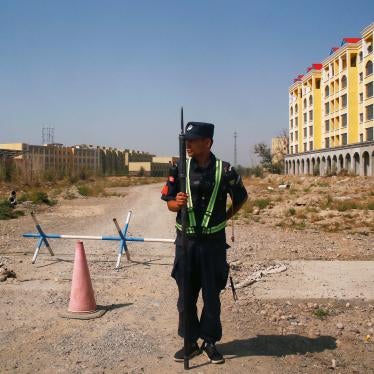(New York) - The Chinese government should account for a group of 20 ethnic Uighurs deported from Cambodia one year ago, Human Rights Watch said today. Over the past year, the Chinese government has consistently refused to provide information about the group's status and well-being.
On December 19, 2009, Cambodia forcibly repatriated 20 Uighur asylum seekers fleeing a crackdown in the Xinjiang Uighur Autonomous Region of China. The group, which had expressed fear of persecution and torture if sent back to China, had been issued "Persons of Concern" letters by the Phnom Penh office of the United Nations High Commission for Refugees (UNHCR), which should have prevented their forced return to possible persecution, known as refoulement. Despite this, the group, which included two young children, was forced aboard a plane in Phnom Penh chartered by the Chinese government.
"Uighurs deported to China are at clear risk of torture," said Sophie Richardson, Asia advocacy director at Human Rights Watch. "China's failure to account for any of those asylum seekers a year after their forced return is extremely worrying."
The crackdown that prompted the group to flee China followed its most violent episode of ethnic unrest in years, in which over 200 people were killed in Urumqi, the regional capital, in July 2009. Hundreds of Uighurs were detained after the violence in Urumqi, and several people have been executed for involvement in the rioting. In October 2009, Human Rights Watch documented 43 cases in which Uighur men had disappeared in Urumqi after having been taken away by security forces. Human Rights Watch also documented grave violations of due process in the trials of suspected protesters.
Urumqi residents interviewed by Human Rights Watch since October 2009 indicated that torture in detention remains a common practice in Xinjiang. There has been no further information about the 42 cases of enforced disappearance documented in the report.
China's record of torture, disappearance, and arbitrary detention of Uighurs, as well as the politicized nature of judicial proceedings in past cases of forced repatriation, raise serious concerns that these individuals remain at risk of torture and ill-treatment, Human Rights Watch said.
"The violence of July 2009 was horrific and unjustifiable," Richardson said. "But it is no ground for the indiscriminate crackdown and the massive human rights violations that followed."
The refoulement of the 20 Uighur asylum seekers constituted a clear violation of Cambodia's obligations as a state party to the 1951 United Nations Convention relating to the Status of Refugees and its 1967 Protocol. Human Rights Watch also knows of at least four Chinese asylum seekers under the protection of the UNHCR who were arrested in Phnom Penh in 2002 and 2004 and sent back to China.
China is also a party to the Refugee Convention and its Protocol, as well as to the United Nations Convention against Torture and Other Cruel, Inhuman and Degrading Treatment, the Convention on the Rights of the Child, and it has signed but not ratified the International Covenant on Civil and Political Rights. It has not yet joined the International Convention for the Protection of All Persons from Enforced Disappearance.
"Both China and Cambodia should be held accountable for their flagrant disregard of their obligations under international law," Richardson said. "This case is a stark reminder that no country should deport Uighur asylum seekers back to China."






